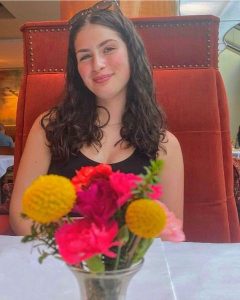Growing up in Owings Mills and attending the Beth Tfiloh Dahan Community School, Nora Leavey says she has a strong and solid Jewish identity, and is proud of who she is.

Though she’s heard stories about the prevalence of antisemitism worldwide, growing up she had never experienced Jew-hatred. That changed two years ago, when a visit to out-of-state family showed her how normalized antisemitism has become.
“At a playground, I saw swastikas painted on the ground, on the mulch,” says Leavey. “That was the first time I was met with antisemitism, and I felt very unwelcomed and immediately tucked my Jewish star in my shirt. I was 15.”
When she told her family, “they didn’t seem surprised. It was if it was normal to them.”
Leavey, now a senior in high school and the chair of the Rise Up Committee — a part of the pluralistic BBYO youth group’s International Leadership Network — believes that it’s vital for her peers to learn how to respond to antisemitism, wherever they find it: at school, the park or online.
“Teens need the tools to understand antisemitism and how to respond to it,” she says.
While not in the greater Baltimore area, antisemitic incidents have been recorded in other parts of the state in recent weeks, as well as in neighboring Virginia. And according to the ADL’s Audit of Antisemitic Incidents, there were 55 incidents of Jew-hatred in Maryland in 2021, up from 47 in 2020.
Seeking to empower teens, BBYO is teaming up with the Anti-Defamation League to provide training on understanding and responding to antisemitism in both the United States and Europe.
“As Jewish teens around the world face increased antisemitic harassment and hate speech in their schools, communities and on social-media platforms, having the tools to understand and respond to antisemitism is vital,” says Matthew Grossman, CEO of BBYO, which has some 70,000 members and 725 chapters in 60 countries.
In addition to the workshops, the two organizations will launch a joint-incident reporting site to encourage teens to report incidents of antisemitism and bias. This data will be collected and evaluated by the ADL Center on Extremism for inclusion in ADL’s annual antisemitism audit.
“Surveys have shown that Jewish students increasingly are experiencing antisemitism at home, in their communities and online at frightening levels,” says Jonathan Greenblatt, CEO and national director of the ADL. “We need to prepare Jewish students to be able to understand the drivers of modern antisemitism and the ways by which they can respond safely and effectively when hate manifests in their lives.”
Prepared to confront hatred and misinformation
As part of the collaboration, ADL’s education experts and BBYO’s Center for Adolescent Wellness developed a new resource to enable adults, particularly educators and parents, to initiate conversations with young people about antisemitism and other forms of hate, while safeguarding the mental health of teens while tackling these difficult topics.
Jewish organization leaders also point out the ability to tackle misinformation as well.
The training will likely help Leavey as she graduates from high schools and moves on to college.
“Obviously, I’m concerned about going off to a college campus and leaving the Jewish community I have grown up in,” she acknowledges. “I am very active in the Jewish community, and I don’t hide my Judaism. And if, God forbid, I’m faced with antisemitism and anti-Zionism, I am prepared to talk to that person or that group.”
Still, she adds, “it is important for everyone, Jewish or not, to fight antisemitism because it is not right to have a breeding ground for hatred against one religion for no reason. We’ve done nothing, and I think everyone should learn how to combat antisemitism and make the world a peaceful place.”







